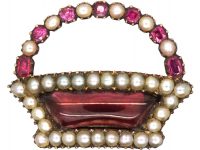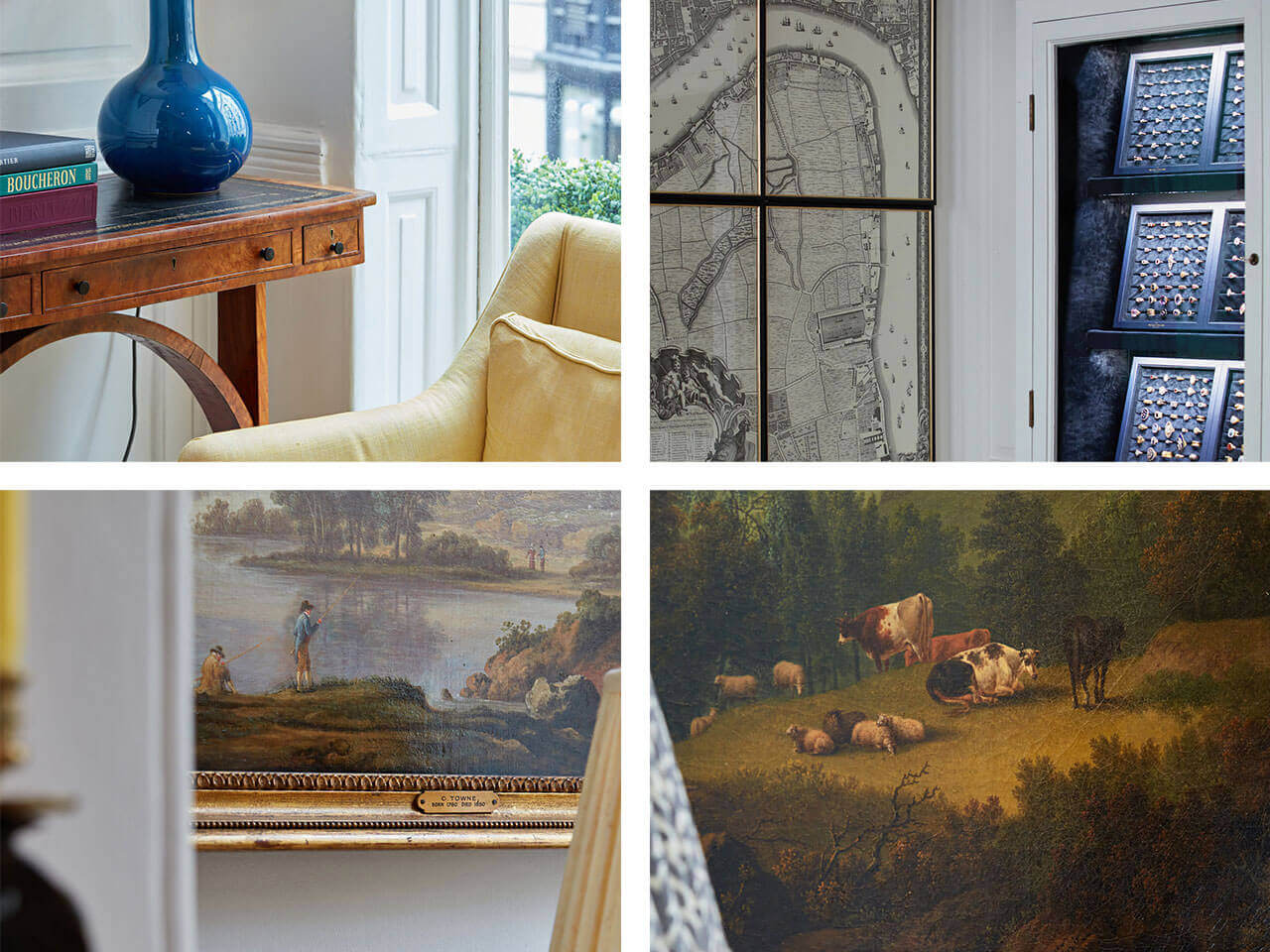-
Your Shopping Bag is empty

Want a Closer Look?
Book a virtual appointment with one of our resident jewellery experts, here in London.
Book Your Virtual Consultation
 Free Australia Shipping
Free Australia ShippingA rare 9ct37.5% pure gold (or 375 parts pure gold and 625 parts other metals) gold GeorgianJewellery made in the Georgian era (1714-1830). brooch in the form of a basket. The handle has been set with alternate naturalA natural stone is called such because it has not been subjected to any treatments. split pearls and rubies. The basket has a carved garnetDescribes a group of several closely related minerals. Garnets come in a variety of colours, however the most common colour is dark red. In descriptions, ‘garnet’ tends to refer to dark red stones unless otherwise specified. and is surrounded by natural split pearls. On the reverse is engraved Sir John Eden Bart (baronet) obt (died) 23 aug (august) 1812 Ae (aged) 71.
Sir John Eden, 4th Baronet (1740–1812), was a British politician who sat in the House of Commons between 1774 and 1790.
Eden was the eldest son of Sir Robert Eden, 3rd Baronet of county Durham, and was born on 16 September 1740. He succeeded his father in the baronetcy on 25 June 1755. He was educated at Eton College and at Trinity College, Cambridge. He married firstly Catherine Thompson daughter of John Thompson of Kirby Hall, Yorkshire on 26 June 1764 and secondly Dorothea Johnson, of York on 9 April 1767.
In 1774 he was returned unopposed as Member of Parliament for Durham County and was a supporter of Lord North’s administration. He was returned again in 1780 although it was said of him shortly after that ‘He holds the business of the House in great contempt, generally comes down after dinner, and is always the first to call for the question.’ He was re-elected in 1784 and at the time of the Regency crisis in 1788 complained of being recalled to parliament. There is no record of his ever having spoken in the House and appeared to prefer hunting to spending time at parliament. In 1789 he became anxious about his seat citing the threat of an alien banker and was defeated in the 1790 British general election. Eden died on 23 August 1812.
This brooch would have been given to a member of the family as a memorialTypically featuring skulls, urns and other symbols of death, these 16th-18th century jewels were inscribed with the names and dates of the deceased. brooch. It could also be worn as a pendant.

A very special Georgian mourningRings made especially to mark the death of a loved one. Often called 'memento mori' rings. Rare examples survive intact and are highly collectable. brooch.
We are pleased to offer FREE SHIPPING on all purchases to our customers in Australia.
All orders are fully insured and dispatched securely from London, England by our trusted partner, DHL Express Worldwide.
We calculate all customs, taxes and duties at checkout, to ensure a smooth journey with no unexpected fees along the way.
When purchasing items over 100 years old:
- Customs, taxes and duty DO NOT apply
- We will mark your package as 'antique, over 100 years old', to ensure no unexpected additional fees
When purchasing items under 100 years old:
- Customs, taxes and duty DO apply
- All customs, taxes and duties will be calculated at checkout and added to the total cost of the order
- We guarantees a smooth and transparent delivery with no unexpected additional fees
We offer a 30 day, full money-back guarantee on all purchases.
Customers from Australia will pay for return postage and any customs, taxes and duties applied.
More info

Book a virtual appointment with one of our resident jewellery experts, here in London.
Book Your Virtual Consultation
Buying antique jewellery is both ethical and eco-friendly as harmful and destructive mining processes are not needed to make an item yours. So give yourself a pat on the back!
Find Out More


We always stand by our five core principles:
Quality, Rarity, Expertise, Peace of Mind and Personal Touch